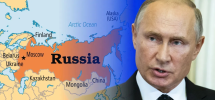Ocean
The Living Force


A Classic Example of Biased Political Reporting: Hartcher on Russia - Gumshoe News
By James O’Neill The Sydney Morning Herald has always been regarded as a reasonably responsible newspaper. Although editorially it was generally a supporter of the misnamed Liberal Party, its opinion pieces generally try to pursue an open mind. Its editorial commentary of course generally...
 gumshoenews.com
gumshoenews.com
The Sydney Morning Herald has always been regarded as a reasonably responsible newspaper. Although editorially it was generally a supporter of the misnamed Liberal Party, its opinion pieces generally try to pursue an open mind. Its editorial commentary of course generally favoured one side of the political divide rather than the other. The writers were generally frank about their perspective, favouring one side or the other. Many of their writers strove for a fundamentally neutral stance, overtly favouring neither one side of politics nor the other.
One could always agree or disagree with a writer’s perspective. As the old adage had it, your interpretation is your own, the facts however are sacred. Thus, it was possible to read a column by a writer from a different political perspective, but except the thrust of their argument because the facts that were presenting led one to a particular conclusion.
The Sydney Morning Herald has, however, moved away from the position of the facts being sacred, leaving their interpretation to be a matter of preference. The specific example which brought this vividly to mind was the recent article by the Herald international editor, Peter Hartcher.
The article was entitled “Global Threat from Strongmen” and appeared in the SMH opinion page on Tuesday, 19 January 2021. Most of the article is devoted to an unqualified attack upon Russia, and in particular its president Vladimir Putin. It commences by asserting that Putin is displaying “a new brazenness.” It was always obvious, Hartcher baldly states without a shred of evidence to support it, that Putin was “directing the assassinations and disappearances of his opponents.”
Killing his opponents with radioactive isotopes and nerve agents were methods, Hartcher claims which “might go undetected in most circumstances”. Really? Where is the evidence for this extraordinary (and false) claim? The evidence does not exist because it is simply not true, either as to its alleged non-detectability, and to the perpetrator of such acts.
Next comes a vague reference to the Soviet-era Novichok which, we are solemnly assured, “can’t be bought at your local chemist or even on the dark web.” What is this vague allegation actually evidence of? When was Novichok used outside the fantastic and vague allegations surrounding former Russian spy Sergei Skripal who with his daughter is currently illegally held incommunicado by the British?
Is Hartcher unaware that Novichok is a drug held by a number of western countries, and that if used will assuredly kill its victim within minutes? Hartcher then goes on to cite whom he calls the “hero of Russia’s opposition movement, the charismatic Alexei Navalny” who took ill on a flight from Tomsk to Moscow in August last year. Navalny may be a “hero” in Hartcher’s eyes. He is significantly less in the eyes of the Russian public, or whom 2% voted for him when he stood for office.
Hartcher is not content with Navalny taking ill on his flight to Moscow. He had to have been the victim of a “suspicious poisoning”. That the plane was diverted so that Navalny could be rushed to hospital where the examining doctors found no evidence of “Novichok” or any other illicit substance is not mentioned.
Neither does Hartcher mention the fact that the doctors voluntarily allowed Navalny to be flown to Berlin. He was not “wrested” from the hospital. It is absurd to suggest that the plane would have been allowed into Russian airspace and those on board allowed to “wrest” him from the hospital and be flown to Berlin. The idea is so fantastic it is difficult to believe that a senior writer could advance it is a serious idea.
We are then treated to an alleged telephone call that Navalny is said to have made from Berlin, to an unsuspecting Federal Security Bureau officer who, according to Navalny, blurts out a fantastic story about a bungled assassination attempt, thereby exposing Putin’s “fearsome security apparatus as ineffective and worse, ridiculous.”
This is the same security service that originally failed to kill Navalny, failed to finish the job whilst he was in hospital, and allowed him to be whisked away to expose to the world their incompetence. Are we seriously expected to believe this unadulterated rubbish?
Hartcher then claims that Putin was “so afraid of Navalny, he barred him from standing for election in 2018.” Actually, Putin did no such thing. Navalny was barred from standing for election because of a criminal conviction, for which he received a suspended sentence. He breached the conditions of his release by staying in Germany, despite receiving a warning from the authorities that he was in breach of his sentence conditions. Hartcher fails to mention these inconvenient facts.
Navalny voluntarily returned to Russia, despite having the certain knowledge he would be arrested. Moments before being arrested, Navalny utters the words we are told; “Putin fears me most. I am not afraid.”
Hartcher goes on in the article to turn his attention to another “authoritarian leader to drop the pretence of any sort of restraint” when he writes a short piece on Chinese president Xi Jinping. But by now one knows what to expect from the mangled worldview of the international editor so I will leave the interested reader to read Hartcher’ blessedly short mangling of Chinese history. If they have the stomach for the continued distortion of history represented in this alleged journalist’s writing.
